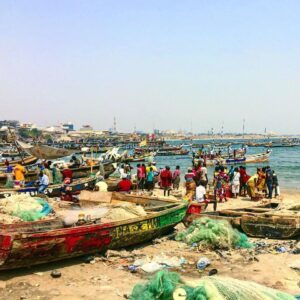Three Days in Accra

By Rachel Janik on January 21, 2016
After 5 days, 29 hours of flying, 2 new countries and 1 new continent – I have recently returned from Accra, Ghana, and I couldn’t be any more grateful for the countless new friendships and opportunities that exist for WI-HER. I was presented with the opportunity to travel to Ghana on behalf of WI-HER regarding business development matters, and I couldn’t have been more thrilled to represent WI-HER in-country. Prepared with my Guide to Ghana travel book, and ready to make the most of a quick 3 days in Africa, the appreciation that I felt for working on a team that allows me to immerse myself in so many different opportunities that enable my growth as a young professional was overwhelming in the best way possible.
After the work for the trip was wrapped up, I had some free time, which was a fantastic way to explore the city and get a more in depth glance of Accra. My time spent in busy markets and roaming around old lighthouses ended up being some of the best business development learning experiences of my trip, as I gained valuable insight and firsthand experience in the process of meeting potential local partners, often under short time frames, and how to take advantage of the immense knowledge and connections of locals while in country. I asked my driver to take me wherever he thought to be best, and one of our first stops was by the water. When I got out of the car, I was approached by local who told me he would take me on a tour of a fishing village, Old Jamestown, which is the oldest and one of the poorest areas of Accra. He turned out to be so much more than your typical guide, and provided me with way more than just a brief historical synopsis. My guide (and new friend) happened to work as a teacher for a Canadian NGO, which provides education for children in Old Jamestown, as most families can’t afford the cost. He took me to a school, and I soon had 40 or so kids dangling from my neck and was told that every morning he goes through town and grabs the kids to make sure they come to school, as they are often out fishing instead in order to help support their families. I asked if boys or girls were less likely than the other to attend school in Old Jamestown, and I learned that boys are more often the ones fishing in order to provide for their families – making it more difficult for males in this community to remain in school. When I returned home I found the Universal Wonderful Street Academy’s website, which explained they are looking for ideas to help them keep children in school in Old Jamestown.
My visit to Old Jamestown was wonderful in too many ways to explain – from the history of the town to the kindness of the community, however most importantly was the realization of the need for education in Ghana. Almost everyone I talked to listed education as a major need for the country, and it was interesting to visit the (private and expensive) University of Legon, and to see the stark contrast between the schools in Old Jamestown. Although primary school enrolment for youth was at 89% in 2014, education is no longer free after primary education (equal to junior high school) and enrolment rates drop by two-thirds for secondary school. Children living in rural Ghana are also more likely to discontinue schooling after they finish primary school, as families are unable to afford school fees and the cost of books, uniforms and other materials, and need their children to help with other household tasks that help generate income. Gender parity in enrolment rates is close to being achieved at the primary education level – however girls are less likely to complete their secondary education. When finances are tight, families typically send boys to school, and girls are often expected to be engaged with household duties, take care of relatives at home, and even start their own families at young ages, however this varies in different communities.
Learning about the need for education was one of the most important lessons from my trip – asking people in the country you want to work in to see what they really need is so critical. The need for education in Ghana might not have presented itself without going to the field, talking to locals, and seeing the problems first hand, as it is often difficult to learn about the true needs of a country from an office in Washington D.C. It’s experiences such as this trip that can lead to new opportunities, which is true in this context for WI-HER. Our team works to identify and address gender constraints that prevent equal educational opportunities and outcomes for women, men, girls and boys. Our approach is always context- and country-specific – and with Ghana being a new country for WI-HER to work in, it’s a new context to learn, design, and adapt our approach to, enabling us to work at addressing the pressing need of closing educational gaps at all levels, for all genders.
Overall, I could not be more thankful for such a wonderful experience in Accra and am excited and fueled with energy for all of the opportunities that await the WI-HER team in Ghana in the new year!